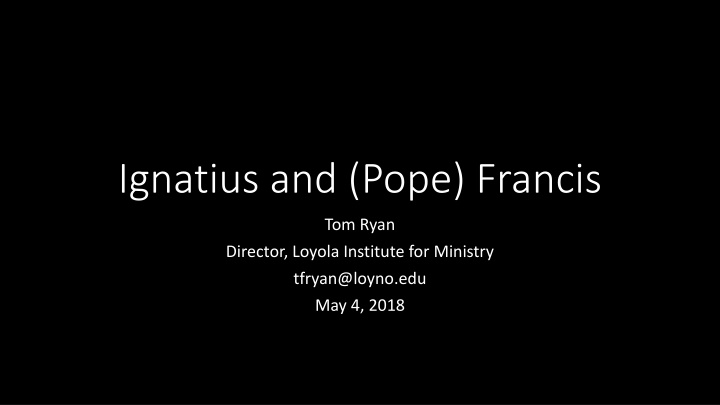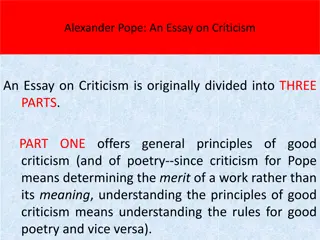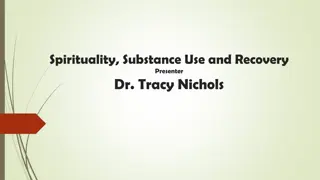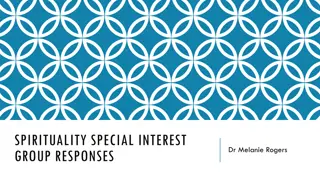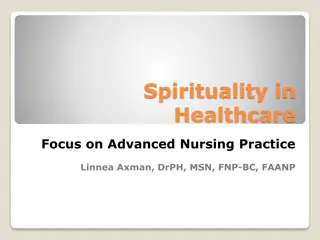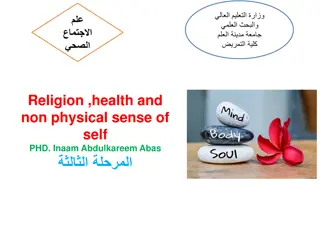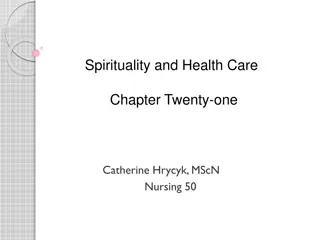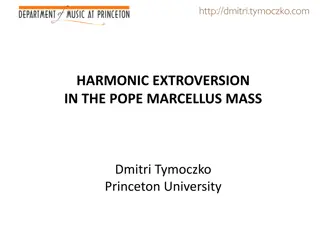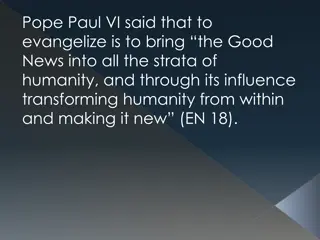Reflection on Ignatian Spirituality and Pope Francis
Explore the intersection of Ignatian spirituality and the teachings of Pope Francis through profound questions for reflection, key themes, and challenges for the Church. Discover opportunities for studying Catholic, Ignatian, and transformative values with practical application in modern ministry.
Download Presentation

Please find below an Image/Link to download the presentation.
The content on the website is provided AS IS for your information and personal use only. It may not be sold, licensed, or shared on other websites without obtaining consent from the author.If you encounter any issues during the download, it is possible that the publisher has removed the file from their server.
You are allowed to download the files provided on this website for personal or commercial use, subject to the condition that they are used lawfully. All files are the property of their respective owners.
The content on the website is provided AS IS for your information and personal use only. It may not be sold, licensed, or shared on other websites without obtaining consent from the author.
E N D
Presentation Transcript
Ignatius and (Pope) Francis Tom Ryan Director, Loyola Institute for Ministry tfryan@loyno.edu May 4, 2018
Opportunities Degrees and Certificates that are Catholic, Ignatian, Practical, Transformative and Affordable scholarships available for on-campus study For more information: cnh.loyno.edu/lim Apply: https://grad.loyno.edu/apply/ New Certificate in Catholic Social Teaching Renewed Focus Area in Small Christian Communities New Focus Area in Youth and Young Adult Ministry Bob McCarty Workshop, Going, Going, Gone: The Dynamics of Disaffiliation Among Young Catholics, August 18, Loyola.
Initial questions for silent reflection What inspires you about Pope Francis? What inspires you about Ignatian spirituality? How has Pope Francis challenged you to live differently or do ministry differently?
Suscipe Take, Lord, receive all my liberty, my memory, my understanding, my entire will. You have given all to me. Now I return it. Everything is yours. Do with it what you will. Give me only your love and your grace and that is enough for me.
Ignatian themes Suscipe: You have given all to me: All is gift/Gratitude To you, Lord, I return it: Praise/Action Everything is yours; do with it what you will. Give me only your love and your grace. That is enough for me: Indifference/freedom
Problem The Church, in order to survive, must stop "living within herself, of herself, for herself (from speech during conclave).
Contemporary Gnosticism Gaudete et Exsultate, 36f Instead of Intellectual exercise that distances us from the freshness of the Gospel Elitism that analyzes and classifies others Inspects and verifies Evangelizing Opening the door to grace Disembodied spirituality We can t say where God is not Domesticates mystery Seeing God as full of surprises
Key Ignatian Themes for Pope Francis De-Centered/Centered on Christ Discernment Consolation
De-Centered At the beginning of the Spiritual Exercises, he places our Lord Jesus Christ, our Creator and Saviour (Spiritual Exercises, 6) in front of us. And this leads all of us to be decentered, to have Christ more and more before us . . . that leads us continually outside ourselves, a going beyond our own loves, desires, and interests (Sp. Ex., 189). Isn t it obvious, the question for us? For all of us? Is Christ the center of my life? Because there is always the temptation to want to put ourselves in the center. (Feast of St. Ignatius, 7/31/13)
Restlessness De-Centered Horizon
Restlessness To be Ignatian means to be a people of incomplete thought, of open thought: because we think always looking to the horizon which is the ever greater glory of God, who ceaselessly surprises us. And this is the restlessness of our inner abyss. This holy and beautiful restlessness! (Feast of the Holy Name of Jesus, 1/3/14)
Restlessness De-Centered Horizon Peripheries
Peripheries go forth from our own comfort zone in order to reach all the peripheries in need of the light of the Gospel (EG 20).
Peripheries I prefer a Church which is bruised, hurting and dirty because it has been out on the streets, rather than a Church which is unhealthy from being confined and from clinging to its own security (EG 49).
Restlessness De-Centered Horizon Peripheries
Horizon To be Ignatian means to be a people of incomplete thought, of open thought: because we think always looking to the horizon which is the ever greater glory of God, who ceaselessly surprises us. And this is the restlessness of our inner abyss. This holy and beautiful restlessness! (Feast of the Holy Name of Jesus, 1/3/14)
Horizon Christians have the duty to proclaim the Gospel without excluding anyone. Instead of seeming to impose new obligations, they should appear as people who wish to share their joy, who point to a horizon of beauty and who invite others to a delicious banquet. It is not by proselytizing that the Church grows, but by attraction (EG 14).
Magnanimity Restlessness De-Centered Horizon Peripheries
Magnanimity The main element at school is to learn to be magnanimous. Magnanimity: this virtue of the great and the small (Non coerceri maximo contineri minimo, divinum est), which always makes us look at the horizon. (Address to Students at Jesuit Schools in Italy and Albania, 6/7/13)
Magnanimity What does being magnanimous mean? It means having a great heart, having greatness of mind; it means having great ideals, the wish to do great things to respond to what God asks of us. Hence also, for this very reason, to do well the routine things of every day and all the daily actions, tasks, meetings with people; doing the little everyday things with a great heart open to God and to others. (Address to Students at Jesuit Schools in Italy and Albania, 6/7/13)
Magnanimity Discernment Non coerceri a maximo, sed contineri a minimo divinum est. Inscription on Ignatius s tombstone Not to be limited by the greatest and yet to be contained in the tiniest this is the divine.
Discernment This motto offers parameters to assume a correct position for discernment, in order to [see] the things of God from God s point of view. ...You can have large projects and implement them by means of a few of the smallest things. Or you can use weak means that are more effective than strong ones, as Paul also said in his First Letter to the Corinthians. ...Discernment is always done in the presence of the Lord, looking at the signs, listening to the things that happen, the feeling of the people, especially the poor. (A Big Heart Open to God, 9/30/13)
Discernment What is the prophetic audacity that is asked of us today? We must discern this. That is, where should this prophetic audacity be channeled? It is an attitude born of the magis. And the magis is parresia [boldness]. The magis is founded on God who is always greater. Looking at that ever greater God, discernment deepens and seeks the places to channel the audacity. (Dialogue w Jesuits at GC 36, 1/24/16)
Consolation The office of consolation ... [Exx 224]... is the work proper to the Society. The [one influenced by Ignatian spirituality] is a servant of the joy of the Gospel. You can t pass on good news with a sad face. (Presentation to GC 35, 10/24/16).
Consolation Publications by Pope Francis Apostolic Exhortations Evangelii Gaudium : Apostolic Exhortation on the Proclamation of the Gospel in Today's World (2013) Amoris Laetitia: Post-Synodal Apostolic Exhortation on love in the family (2016) Gaudete et Exsultate: Apostolic Exhortation on the call to holiness in today's world (2018) Encyclicals Lumen Fidei: On Faith (2013, with Pope Emeritus Benedict) Laudato Si : On Care for our Common Home (2015)
Consolation Publications by Pope Francis Apostolic Exhortations Joy of the Gospel: Apostolic Exhortation on the Proclamation of the Gospel in Today's World (2013) Joy of Love: Post-Synodal Apostolic Exhortation on love in the family (2016) Rejoice and Be Glad: Apostolic Exhortation on the call to holiness in today's world (2018) Encyclicals Light of Faith: On Faith (2013, with Pope Emeritus Benedict) Praise Be to You: On Care for our Common Home (2015)
Consolation There are Christians whose lives seem like Lent without Easter. I realize of course that joy is not expressed the same way at all times in life, especially at moments of great difficulty. Joy adapts and changes, but it always endures, even as a flicker of light born of our personal certainty that, when everything is said and done, we are infinitely loved (EG 6).
Consolation Christians have the duty to proclaim the Gospel without excluding anyone. Instead of seeming to impose new obligations, they should appear as people who wish to share their joy, who point to a horizon of beauty and who invite others to a delicious banquet. It is not by proselytizing that the Church grows, but by attraction (EG 14).
Concluding Reflections What insights have you gained? What would you add? What might you do differently?
